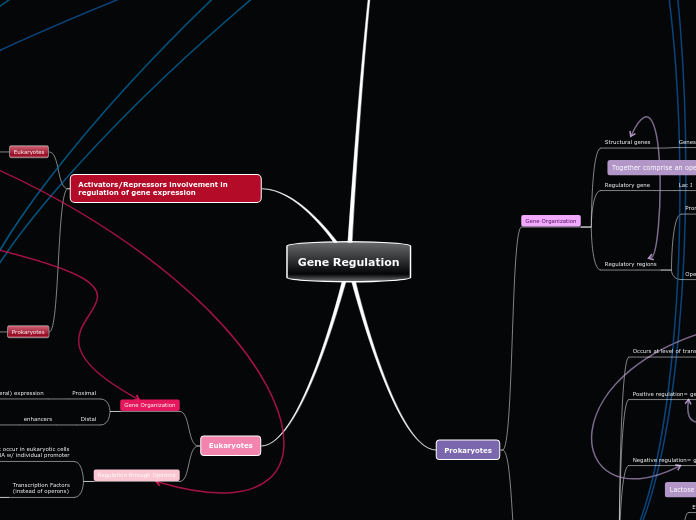Gene Regulation
Activators/Repressors are
Activated/Made
Protein
Binds to operator
Positive Regulation
Activator
Operon Gene Regulation On
Negative Regulation
Repressor
Operon Gene Regulation Off
Specific Transcription Factor
Last gene that enters the nucleus
Turns gene regulation on or off
Far Away from the Gene
Activator binds to enhancer
DNA bending brings activator
closer to promotion site
Activators bind to mediator proteins
Brings the activator closer to
the promotion site
Prokaryotes
Gene Organization
Structural genes
Genes whose expression is controlled together
Lac A
Structural Gene for B-Galactoside transacetylase
Lac Y
Structural Gene for B-Galactoside permease
Lac Z
Structural Gene for B-Galactosidase
Regulatory gene
Lac I
Codes for repressor protein
Regulatory regions
Promoter
Occurs structural and regulatory gene/s
Operator
“Switch” is a segment of DNA
Location where protein binds
Proteins are called activators/repressors
The binding causes positive/negative regulation
Turn on gene expression
Turn off gene expression
Regulation Through Operons
Occurs at level of transcription
Positive regulation= gene expression ON
expression at high level
With activator, transcription occurs
Without activator, no transcription occurs
Negative regulation= gene expression OFF
Repressor protein bond to operator sequence
With repressor, no transcription occurs
Without repressor, transcription occurs
Lac Operon
Example of negative and positive regulation
Regulation needs both repressor and operator
Lac= Lactose
Disaccharide made of glucose and galactose
Inducer of the lac operon
Lactose absent, repressor active, operon off
Transcription of structural genes is blocked
Negative regulation of operon
Lactose present, glucose scarce (cAMP level high)
Abundant lac mRNA synthesized
Operon ON: Induced/ high expression
Activator protein CAP is activated by cAMP
CAP helps RNAP to bind promoter
Facilitates transcription
Lactose present, repressor inactive, operon on
No glucose= operon ON
Inducible operon
All structural genes are transcribed
Forms a long mRNA
mRNA translates= B-Galactosidase, Permease, Transacetylase
Takes in more Lactose from outside
Break it down to glucose and galactose
Uses sugars as needed
Lactose present, glucose present (cAMP level low)
Little lac mRNA synthesized
Presence of Glucose operon OFF
Blocks Adenylyl Cyclase
Prevents production of cAMP
CAP cannot be activated
CAP can't help RNAP to bind promoter
Activators/Repressors involvement in regulation of gene expression
Eukaryotes
Transcription factors
Proteins that help turn specific genes "on" or "off"
Help increase or decrease level of transcription
General
Low levels of transcriptions
Background/basal
Bind to promoter and regions near
Specific
Change levels of transcription
Increase levels of transcription
Done by activators
High levels of transcription are reduced by repressors
Bind to distal control elements called enhancers
Present near or far from gene they are controlling
Control elements in DNA
Proximal
Sequences in DNA close to promoter
Bind general transcription factors
Distal
Enhancers
Sequences in DNA upstream or downstream of gene
Can be close or far from gene they are controlling
Bind to specific transcription factors
Prokaryotes
Operons
Helps with regulation with an on-off switch
"Switch"
Segment of DNA known as an "operator"
Positioned within promoter
Proteins bind to operators to turn on gene expression for multiple genes
OR to turn off expression
Postive regulation
Negative regulation
Eukaryotes
Gene Organization
Proximal
basal (general) expression
specific to eukaryotes
(ex. humans)
Distal
enhancers
bind activator proteins
activator bound to receptor is brought
to promoter via DNA bending proteins
transcription increased via
RNA polymerase II
Regulation through Operons
operons do not occur in eukaryotic cells
- made in mRNA w/ individual promoter
Transcription Factors
(instead of operons)
activators
repressors
